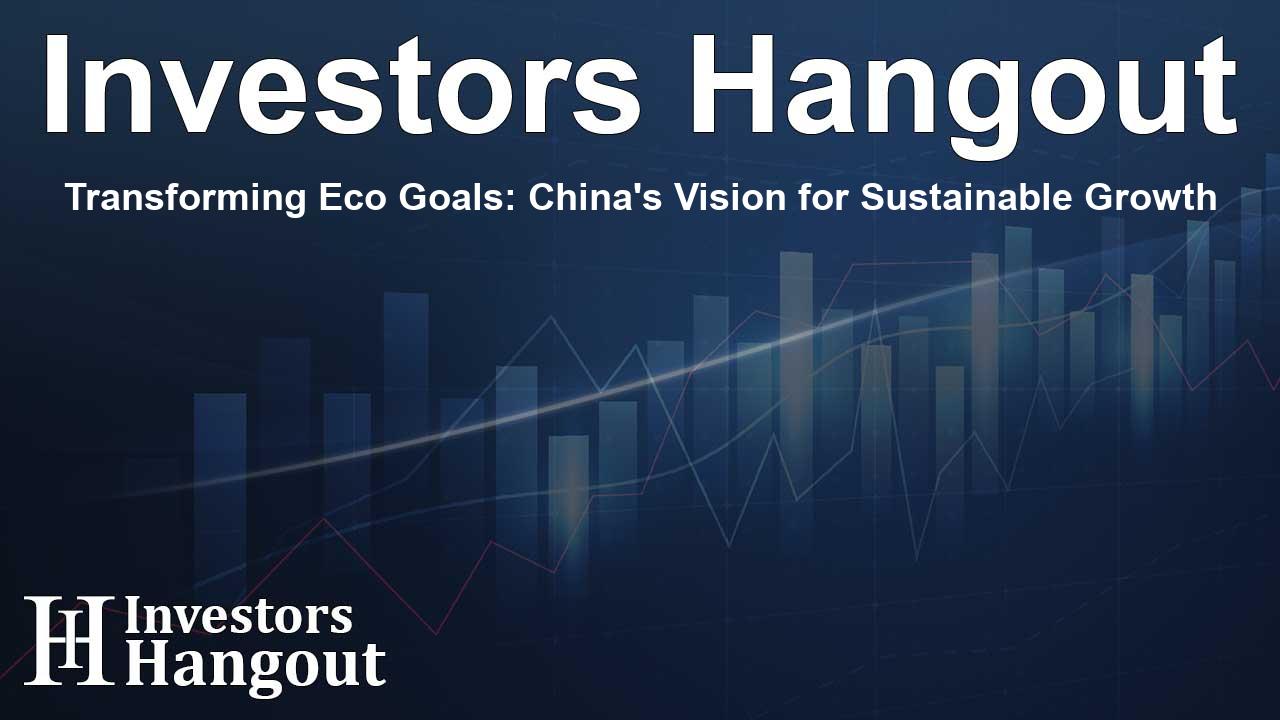Transforming Eco Goals: China's Vision for Sustainable Growth

Transforming Eco Goals: China's Vision for Sustainable Growth
In the realm of sustainable development, a pivotal shift is underway, emerging through the lens of the concept that "lucid waters and lush mountains are invaluable assets." This paradigm, introduced by President Xi Jinping, serves as a foundation for reshaping how societies view environmental and economic interplay. Rather than seeing economic progress and environmental health as opposing forces, this new approach advocates for their integration.
Understanding the Philosophy of Ecological Civilization
The idea that nature should not be sacrificed for immediate economic gains has led China to construct a framework for eco-civilization, steering the nation towards responsible environmental stewardship. The strategic implementation of policies like the ecological red lines program illustrates China's commitment to protecting nearly a third of its land from destructive practices. This not only secures biodiversity but also ensures that economic activities harmonize with environmental integrity.
Innovative Paths to Sustainable Growth
China's vigorous investments in renewable energy such as solar and wind power demonstrate a robust commitment to reducing emissions without sacrificing growth. Heavy industries are now operating under strict pollution controls, emphasizing that economic development and environmental protection can coexist. The rise of eco-tourism and organic farming in rural areas exemplifies a shift towards utilizing once-neglected landscapes as sources of sustainable income.
Learning from China's Development Model
This revolutionary perspective exemplifies a profound shift in mindset: economic progress and environmental health are not adversaries but allies. For developing nations, especially those in the Global South, this model presents an opportunity to bypass traditional, polluting paths of development. With contemporary technologies at their disposal, these nations can forge cleaner, more sustainable growth trajectories that prioritize ecological balance.
Leadership in Ecological Governance
The leadership role played by the Communist Party of China (CPC), particularly under President Xi, has been central to advancing these ecological ideals. It frames ecological civilization as not just an environmental initiative but a comprehensive developmental framework that integrates ecological, economic, social, and political dimensions. The emphasis on long-term planning and cross-sector cooperation ensures that ecological objectives permeate through laws and industry practices.
Embedding Sustainability in National Strategy
China's new developmental philosophy, which emphasizes innovative, coordinated, green, and open growth, has reshaped national priorities by making sustainability a core principle of growth. By promoting high-value sectors and integrating renewable energy development, China is moving away from GDP-focused growth towards a comprehensive ecological civilization. The ambitious dual carbon goals, aiming for carbon peaking by a certain year and achieving carbon neutrality thereafter, illustrate this commitment further.
The Long-Term Vision for Future Generations
A focus on leaving future generations with a healthy planet is evident in President Xi's perspective. This commitment manifests as a holistic governance approach prioritizing ecological conservation intertwined with economic planning. Systems such as market-based tools and ecological red lines are designed to stabilize ecosystems while promoting sustainable growth.
Transforming Ecological Values into Action
President Xi's advocacy for biodiversity and a collective global community highlights a thoughtful approach to environmental stewardship. Transforming these ecological values into actionable policies on the international stage fosters cooperation among nations, enabling a united response to global ecological challenges. China's potential to engage in cooperative international initiatives emphasizes a commitment to shared ecological concerns that transcend ideological divides.
Strategies for Global Cooperation
To effectively translate values into action, China can utilize various platforms for strengthening global governance frameworks, aligning actions with global sustainability goals, and launching initiatives that involve the private sector. By emphasizing inclusive dialogue and fostering win-win partnerships, China can expand its leadership role in ecological preservation while encouraging communal growth and energy transition.
Frequently Asked Questions
What is the core concept introduced by President Xi Jinping regarding ecological development?
The core concept emphasizes that "lucid waters and lush mountains are invaluable assets," promoting the idea that environmental health is crucial for sustainable progress.
How has China's approach to environmental policy changed development perceptions?
China's approach has shifted the perception from viewing economic growth and environmental health as conflicting forces to recognizing them as complementary partners for a sustainable future.
What specific policies has China implemented to protect its ecology while ensuring economic growth?
Policies such as the ecological red lines program and substantial investments in renewable energy exemplify China's commitment to balancing environmental protection with economic progression.
How does Xi Jinping's leadership influence ecological governance in China?
Xi's leadership establishes ecological civilization as a developmental paradigm, integrating various aspects of governance to ensure that ecological objectives are met effectively.
What role does global cooperation play in China's ecological vision?
Global cooperation is crucial for translating ecological values into collective action, enabling countries to address biodiversity loss and ecosystem degradation collaboratively.
About The Author
Contact Logan Wright privately here. Or send an email with ATTN: Logan Wright as the subject to contact@investorshangout.com.
About Investors Hangout
Investors Hangout is a leading online stock forum for financial discussion and learning, offering a wide range of free tools and resources. It draws in traders of all levels, who exchange market knowledge, investigate trading tactics, and keep an eye on industry developments in real time. Featuring financial articles, stock message boards, quotes, charts, company profiles, and live news updates. Through cooperative learning and a wealth of informational resources, it helps users from novices creating their first portfolios to experts honing their techniques. Join Investors Hangout today: https://investorshangout.com/
The content of this article is based on factual, publicly available information and does not represent legal, financial, or investment advice. Investors Hangout does not offer financial advice, and the author is not a licensed financial advisor. Consult a qualified advisor before making any financial or investment decisions based on this article. This article should not be considered advice to purchase, sell, or hold any securities or other investments. If any of the material provided here is inaccurate, please contact us for corrections.
